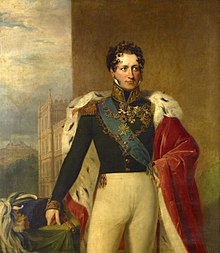Ernst I, Duke of Saxe-Coburg and Gotha
| Ernest I | |||||
|---|---|---|---|---|---|

Portrait by George Dawe
|
|||||
|
Duke of Saxe-Coburg-Saalfeld (as Ernest III) |
|||||
| Reign | 9 December 1806 – 12 November 1826 |
||||
| Predecessor | Francis | ||||
|
Duke of Saxe-Coburg and Gotha (as Ernest I) |
|||||
| Reign | 12 November 1826 – 29 January 1844 |
||||
| Successor | Ernest II | ||||
| Born |
2 January 1784 Coburg, Saxe-Coburg-Saalfeld, Holy Roman Empire |
||||
| Died | 29 January 1844 (aged 60) Gotha, Saxe-Coburg and Gotha, German Confederation |
||||
| Burial | Morizkirche, then Friedhof am Glockenberg | ||||
| Spouse |
Louise of Saxe-Gotha-Altenburg Duchess Marie of Württemberg |
||||
| Issue |
Ernest II, Duke of Saxe-Coburg and Gotha Albert, Prince Consort |
||||
|
|||||
| House | Wettin | ||||
| Father | Francis, Duke of Saxe-Coburg-Saalfeld | ||||
| Mother | Countess Augusta of Reuss-Ebersdorf | ||||
| Religion | Lutheranism | ||||
| Full name | |
|---|---|
| (German: Ernst Anton Karl Ludwig) (English: Ernest Anthony Charles Louis) |
Ernest I, Duke of Saxe-Coburg and Gotha (German: Ernst Anton Karl Ludwig Herzog von Sachsen-Coburg und Gotha; 2 January 1784 – 29 January 1844) was the last sovereign duke of Saxe-Coburg-Saalfeld (as Ernest III) and, from 1826, the first sovereign duke of Saxe-Coburg and Gotha (as Ernest I). He was the father of Albert, Prince Consort of Queen Victoria and is thus a patrilineal ancestor and great-great-great-grandfather of Queen Elizabeth II. Ernest fought against Napoleon Bonaparte and through construction projects and the establishment of a court theatre left a strong imprint on his residence town, Coburg.
Ernest was the eldest son of Francis, Duke of Saxe-Coburg-Saalfeld, and Countess Augusta of Reuss-Ebersdorf. His youngest brother, Leopold Georg Christian Frederick, was later elected the first King of the Belgians.
On 10 May 1803, aged 19, Ernest was proclaimed an adult because his father had become gravely ill, and he was required to take part in the government of the duchy. When his father died in 1806, he succeeded in the duchy of Saxe-Coburg-Saalfeld as "Ernest III". However, he could not immediately take over the formal government of his lands, because the duchy was occupied by Napoleonic troops and was under French administration. The following year, after the Peace of Tilsit (1807), the duchy of Saxe-Coburg-Saalfeld was reunited (having previously been dissolved) and restored to Ernest. This occurred through Russian pressure, since his sister Juliane was married to the brother of the Russian Tsar.
In Gotha on 3 July 1817, Ernest married Princess Louise of Saxe-Gotha-Altenburg. They had two children:
...
Wikipedia
